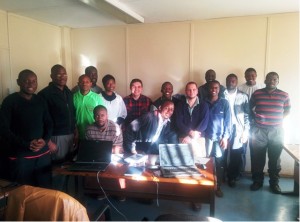International Standards Adopted in Zimbabwe for National Health Worker Registry
These programmers see the light, embrace international standards for the Zimbabwe Ministry of Health and Child Care’s new national health worker registry.
The registry is a database that will pull together a basic set of data on health workers from various information systems in the country.
Once the data are available, health leaders can use them to make all kinds of decisions that can improve the health of Zimbabweans—from influencing health workforce policy to improving the delivery of clinical services.
But first, the computer programmers in this photo had to figure out how to make the different systems “talk” to the registry, or share agreed-upon information.
That’s why IntraHealth joined Zimbabwe’s Health Informatics Training and Research Advancement Center (HITRAC) and Jembi Health Systems to hold a one-week “OpenHIE coding academy.” All three organizations are members of OpenHIE, an open source community that helps countries strengthen their health information and developed the model registry on which Zimbabwe’s is based.
Most of the programmers work for HITRAC, which is leading the work that’s funded by the Health Information Public-Private Partnership.
During the week, the programmers created a plan for integrating information from the ministry’s health workforce information system and other information systems in the country, like those managed by the health professional councils, TrainSMART (which tracks in-service training for health workers), and DHIS2 (which tracks service delivery info and disease statistics).
The plan ensures that the registry is compatible with the international Care Services Discovery standard, a defined way to exchange data that makes it easier to access and merge health workforce data from various sources, and that data-sharing is secure.
IntraHealth’s Carl Leitner co-authored the Care Services Discovery standard and facilitated the academy (he’s sixth from the right in the photo above). He explains why all this matters:
“If countries follow international standards, they open themselves up to innovative health workforce information tools developed by other countries that follow the same standard,” Leitner says. “What is really exciting is we have opened up the possibilities for the ‘appification’ of health workforce and health services data. In other words, we are creating a market opportunity for country and regional software developers to make use of health service data in their own apps.”
The model health worker registry is based on IntraHealth’s iHRIS and OpenInfoMan software platforms developed under the IntraHealth-led and USAID-funded CapacityPlus project. Other current implementations include Nigeria and Rwanda.
By Carol Bales and Dr. Carl Leitner
Read more about the coding academy.
Read more about why data standards are important.
Photo courtesy of Carl Leitner.

